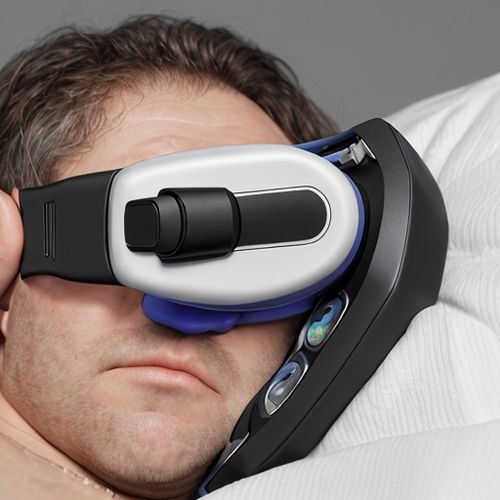In the ongoing quest to address the myriad health challenges faced by individuals struggling with obesity, a significant breakthrough has emerged. Zepbound (tirzepatide), a weight-loss drug that has already garnered attention for its efficacy in promoting weight reduction, has now been granted a new major benefit by the U.S. Food and Drug Administration (FDA). On December 20, Zepbound became the first drug approved to treat obstructive sleep apnea, a condition that affects millions and often goes undiagnosed. This development marks a pivotal moment in the treatment landscape for both obesity and sleep apnea, offering hope to those who have long sought more effective solutions.
The Science Behind Zepbound's Approval
The journey to this landmark approval began with a comprehensive clinical trial conducted by Eli Lilly, the drug's manufacturer. In April, scientists submitted data to the FDA demonstrating Zepbound's remarkable impact on sleep apnea symptoms. The trial involved individuals who were overweight or obese and suffered from obstructive sleep apnea, a condition characterized by the relaxation of throat muscles that block air passages during sleep. The study's results were nothing short of impressive: participants who took Zepbound experienced a 63% reduction in a standard measure of restricted breathing, leading to an average of 30 fewer interrupted sleep events per night compared to those given a placebo.
The study was designed with two distinct analyses to evaluate the drug's efficacy comprehensively. The first analysis compared individuals taking only Zepbound to a placebo group. The second involved participants using Zepbound in conjunction with a positive airway pressure (PAP) device, which is currently one of the standard treatments for obstructive sleep apnea. This group was compared to another using a placebo and a PAP device. The findings revealed that those using both Zepbound and PAP reported even fewer interruptions in breathing compared to those using Zepbound alone. However, it's important to note that the two analyses involved different groups of people, with those using PAP likely experiencing more severe sleep apnea.
The Mechanism of Action
Obstructive sleep apnea is a complex condition with multiple contributing factors, but excess fat tissue is a significant culprit. This tissue can lead to the collapse of the airway during sleep, causing breathing interruptions. Zepbound's mechanism of action is rooted in its ability to promote weight loss, which in turn reduces the frequency of these obstructions. "We hypothesized, and now have proven, that when you treat with tirzepatide, you remove some fat and the airway can stay open," explains Dan Skovronsky, chief scientific officer at Eli Lilly.
This dual impact—addressing both obesity and sleep apnea—makes Zepbound a groundbreaking treatment option. Obesity and sleep apnea are often intertwined, with each condition exacerbating the other. By targeting the underlying issue of excess weight, Zepbound not only improves sleep quality but also reduces the cardiovascular risks associated with both conditions.
The Broader Implications
The FDA's approval of Zepbound for obstructive sleep apnea is a game-changer for several reasons. Firstly, it offers a pharmacologic therapy where previously there was none. Traditional treatments for sleep apnea, such as PAP devices, can be cumbersome and are not always well-tolerated by patients. Zepbound provides an alternative that can be integrated into a daily routine without the need for additional equipment.
Moreover, the approval underscores the importance of addressing the root causes of health conditions. Obesity is a significant risk factor for numerous chronic diseases, including heart failure and kidney disease. Studies conducted by Eli Lilly have shown that Zepbound can also reduce the progression of these conditions, further highlighting its potential as a comprehensive treatment option.
The Challenge of Diagnosis
Despite its prevalence, obstructive sleep apnea remains poorly diagnosed. Many individuals who suffer from the condition are unaware of it, leading to untreated health risks and reduced quality of life. The approval of Zepbound could help change this narrative by encouraging more conversations between doctors and patients about the symptoms and potential treatments for sleep apnea.
Skovronsky emphasizes the importance of early intervention: "Obstructive sleep apnea is still poorly diagnosed. But this is a disease that itself carries cardiovascular risk, as does obesity, so it’s great to treat both." By addressing both conditions simultaneously, Zepbound offers a holistic approach to improving health outcomes.
Practical Considerations and Future Directions
While the approval of Zepbound for obstructive sleep apnea is a significant milestone, it is essential to consider its practical implications. The drug is indicated for individuals who are overweight or obese, highlighting the need for personalized treatment plans. Doctors will need to carefully evaluate each patient's medical history and current health status to determine the most appropriate course of action.
Additionally, ongoing research will be crucial to further understand the long-term effects of Zepbound on sleep apnea and related conditions. Future studies should explore the drug's impact on different patient populations, including those with varying degrees of sleep apnea severity. This will help refine treatment guidelines and ensure that Zepbound is used effectively and safely.
A New Era in Sleep Apnea Management
The approval of Zepbound by the FDA for the treatment of obstructive sleep apnea marks a new era in the management of this debilitating condition. By addressing both obesity and sleep apnea, Zepbound offers a comprehensive solution that can significantly improve patients' quality of life. Its ability to reduce the frequency of breathing interruptions and lower cardiovascular risks makes it a valuable addition to the treatment arsenal.
As we look to the future, the potential for Zepbound extends beyond sleep apnea. Its impact on weight loss, heart failure, and kidney disease highlights the drug's versatility and underscores the importance of continued research. With careful consideration and personalized treatment plans, Zepbound has the potential to transform the lives of millions struggling with obesity and related health conditions. This approval is not just a victory for science but a beacon of hope for those seeking better health and improved well-being.

By Sarah Davis/May 19, 2025

By Natalie Campbell/May 19, 2025

By George Bailey/May 19, 2025

By Lily Simpson/May 19, 2025

By David Anderson/May 19, 2025

By Olivia Reed/May 19, 2025

By Amanda Phillips/May 19, 2025

By Sophia Lewis/May 19, 2025

By Olivia Reed/May 19, 2025

By Emily Johnson/May 19, 2025

By John Smith/May 18, 2025

By Eric Ward/May 18, 2025

By Jessica Lee/May 18, 2025

By Jessica Lee/May 18, 2025

By Sophia Lewis/May 18, 2025

By Rebecca Stewart/May 18, 2025

By Emily Johnson/May 18, 2025

By Rebecca Stewart/May 18, 2025

By Megan Clark/May 18, 2025

By Megan Clark/May 18, 2025